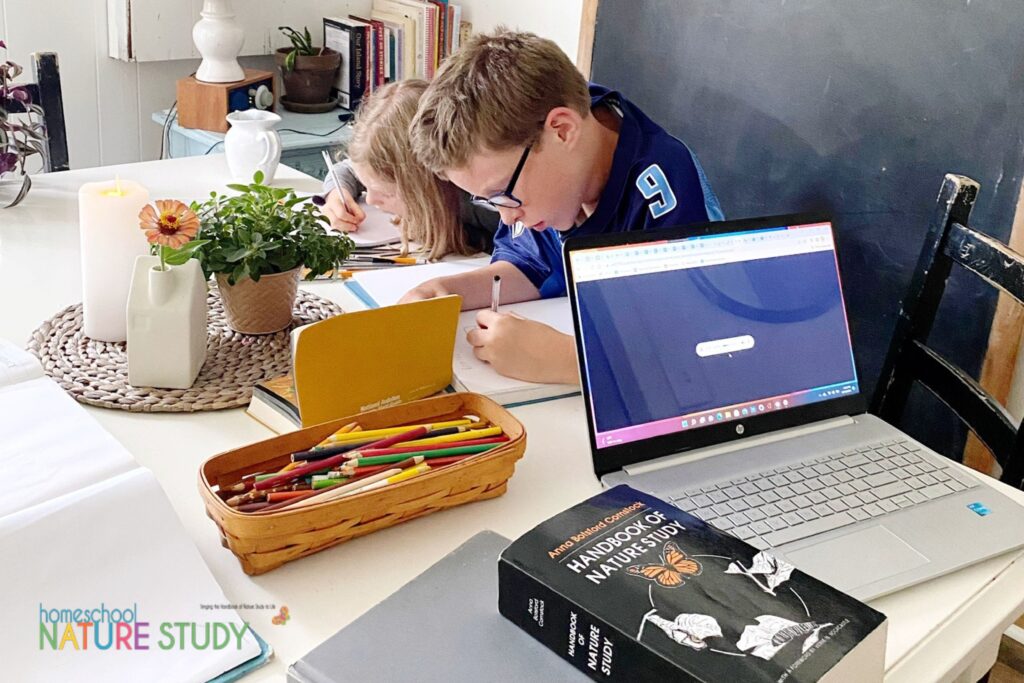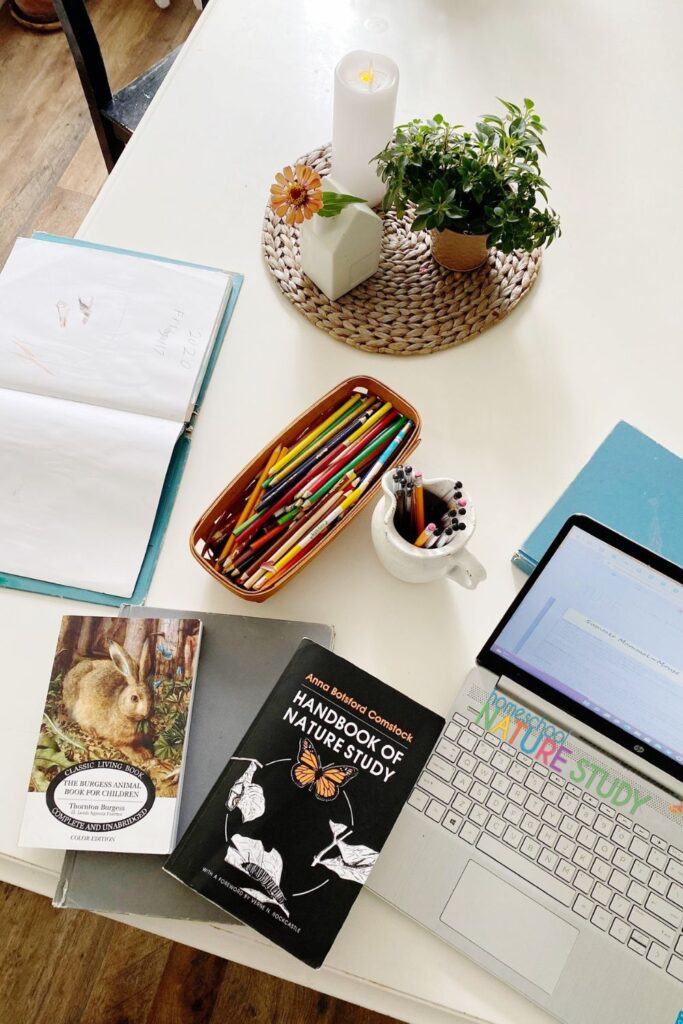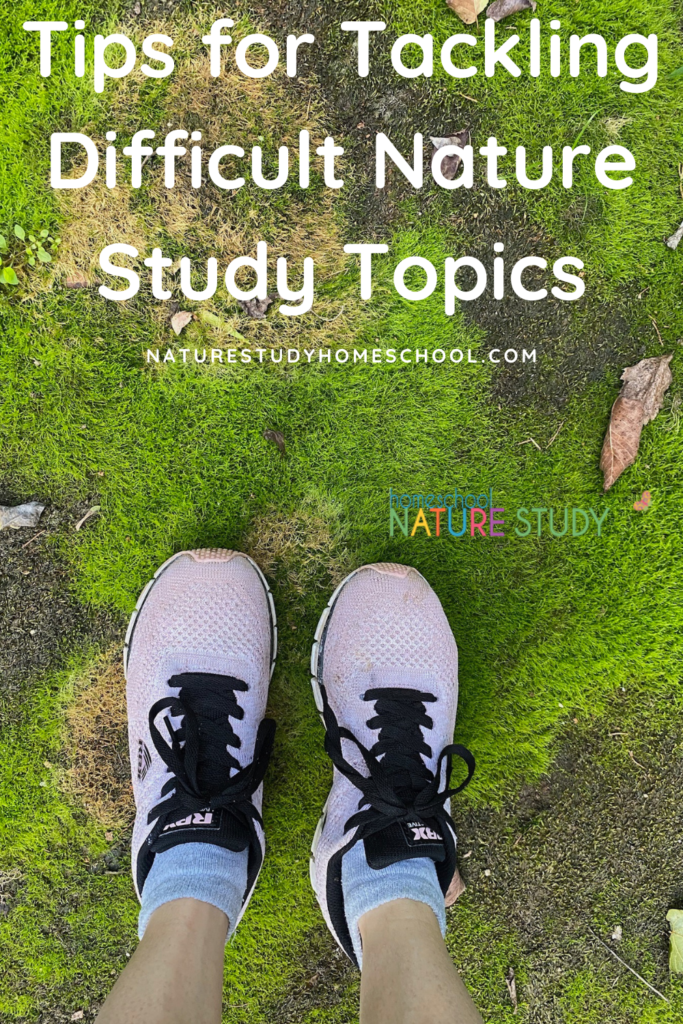All homeschooling moms have them: homeschool topics that we don’t feel confident to teach. Here are some tips for tackling difficult nature study topics.

Building the Habit of Tackling Difficult Nature Study Subjects In Our Homeschools
Tackling the difficult topics found in nature study can be a stumbling block for many moms. Most of us find it easy to be interested in and to learn about topics like birds and butterflies alongside our children. But, what about things like spiders, fungus, or rocks? Are we as eager to study those things commonly found in nature? I’ve suffered from this lack of interest in tackling difficult topics in nature study with my children.
Reasons We May View Topics as Difficult
Let’s face it. Most of us are not “experts” in nature study. These things were not covered in our educational years. So many times, when we’re faced with introducing our children to nature study, we feel unqualified.
We lack knowledge in the area under study.
“But she should not let lack of knowledge be a wet blanket thrown over her pupils’ interest. She should say frankly, ‘I do not know; let us see if we cannot together find out this mysterious thing.’”
Handbook of Nature Study, page 3
We lack personal interest in a topic.
It’s our attitude about a topic that can either encourage or discourage our children in their pursuing the study of a topic. If you are disgusted by spiders, they will probably take on your attitude. Honestly, I found studying snakes one of the most difficult things to do with my children so I would continually put it off until a future date.
Resources may not be readily available.
At some point, we come across something during our nature study time that is not in the Handbook of Nature Study. It may be a local wildflower or a migrating bird. Whatever the topic, we lack the knowledge or resources to easily study it with our children. We realize we need to do more research in our study. It seems like too much work.

Ideas to Help with Difficult Nature Study Subjects
Start with the Handbook of Nature Study lessons for a topic.
Build Up Knowledge
If you need additional information, try the children’s section at your public library for books that talk about the topic. Search for videos on YouTube if you want some help making a topic less intimidating. (Note: The Outdoor Hour Challenges (OHC) will usually have all these ideas in the lesson so make sure to look up your topic to see if there is an OHC on the website that you may be able to use.)
Example from our nature study:
Rain Beetle – How to Identify a New Insect: I found that the closer I looked at this insect, the more beauty I found in its design and features. It taught me that sometimes if we just take time to learn more about a topic, the more interesting it becomes.
Develop Interest Over Time
If you introduce a topic and it falls flat, nothing says you can’t move onto something else. Sometimes you just need to let some time pass before you find a hook for a particular nature study topic. This is especially the case when you’re studying a subject that you haven’t encountered in person. We all get more excited about something new we see and experience with our own eyes!
“No teacher is expected to teach all the lessons in this book. A wide range of subjects is given, so that congenial choices may be made.” Handbook of Nature Study, page 24
Study a Variety of Nature Study Subjects
There is no end to the variety of nature study subjects available to you. You could easily stick to topics you are passionate about for a long time. Eventually, you may develop a desire to tackle some of the less attractive topics with your children. Give it time.
“Usually, the reason for this lack of interest is the limited range of subjects used for nature study lessons. Often the teacher insists upon flowers as the lesson subject, when toads or snakes would prove the key to the door of the child’s interest.” Handbook of Nature Study, page 6
Find a Group That Can Support Your Study
Ask around your community or look at local social media to find a group or event that will help you get excited about a nature study topic. Ask at a local nature center. Put the word out in your homeschooling community. Find a mentor for a topic that your child is interested in learning more about and you have no interest in tackling. There is no shame in finding help for difficult topics.
My Homeschool Mom Experience with Tackling Diffucult Nature Study Topics
One year we studied rocks and I took the kids to the local rock and mineral show at our fairgrounds. Talk about the perfect place to find a mentor in this area! Most of the participants were eager to share their knowledge and even invited the kids to join their rockhounding group. I was able to get suggestions for places to go look for rocks to collect and for books that we could add to our nature library.
More Ways to Include Nature Study in Your Homeschool
Here are a few more ideas you might enjoy:
- Using the Public Library to Enhance Your Nature Study
- How to Use the Outdoor Hour Challenges for Your Homeschool Family Nature Study
- 3 Tips for Nature Journaling When You Think You Can’t Sketch
- Does Homeschool Nature Study Count as Science?
- Project Based Learning: A Nature Study Calendar of Firsts

Homeschool Nature Study Membership
All of the materials in Homeschool Nature Study Membership are going to give you support and direction in offering a simple study of difficult nature topics. Because we each have our individual likes and dislikes, it’s hard for me to point to just one resource for you to use in your study.
Be inspired. Be encouraged. Get outdoors!
